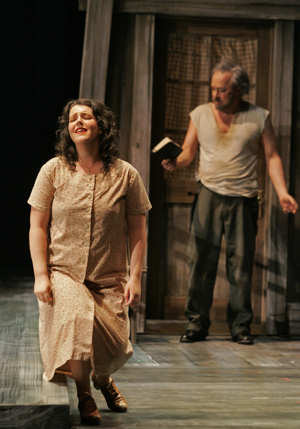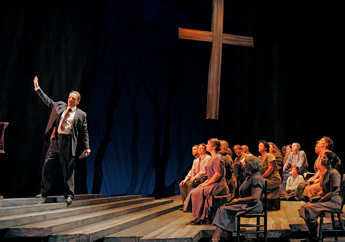|
|
|

Editorial
Board
London Editor:
(London UK)
Melanie
Eskenazi
Regional Editor:
(UK regions and Worldwide)
Bill
Kenny
Webmaster:
Bill
Kenny
Music Web Webmaster:
Len
Mullenger



|
MusicWeb is a
subscription-free site
Clicking Google adverts on our pages helps us keep it that way
Seen
and Heard International Opera Review
Carlisle Floyd, Susannah:
Soloists, Chorus and Orchestra of
Arizona Opera, Joel Rivzen (conductor)
Tucson Music Hall 28-9.4.2007 (NdV)

Arizona Opera ended its 2006/07 season
with a tightly-knit, well-tuned
presentation of Carlisle Floyd's
Susannah, his best known opera
that has enjoyed numerous productions
since its New York City Opera debut in
1956. The work is based on the
Biblical account of Susannah and her
Elders from the Book of Daniel, as it
appears in certain Bibles. From that
account we learn the Elders, who
steadfastly lust after Susannah, spy
on her while she is bathing and soon
realize that the young beauty will
never give in to their lascivious
advances, so they accuse her of
fornicating with a young man. This
charge is eventually proven false, and
Susannah is saved from death. Floyd,
using a librettist's poetic license,
simplified the storyline by relocating
the bathing Susannah to an isolated
community called New Hope Valley in
the Appalachian Mountains of
Tennessee. There, she is observed by
her own church Elders who are repelled
by her audacity to bath in a small
stream which is supposed to be used
for baptism.
Obviously Floyd felt very comfortable
with this regional setting which is
reminiscent of his own upbringing as a
minister's son and uses what he
thought was a natural reaction by
folks who live in such a stark rural
setting to Susannah's spontaneous and
frivolous behavior. Even in the 1950s,
in the United States, with the
McCarthy witchhunters combing the
country looking for those with perhaps
the slightest connection to the
Communist Party, Floyd's characters
might have appeared a tad too quick to
condemn what was perceived as
Susannah's immoral conduct and now,
over 50 years later, with all the
dramatic and diverse social changes
that have occurred in American life,
the pivotal situation of the plot does
seem too pat.

Any opera company that wants to mount
Floyd's opera has to get beyond this
flaw so that it can present the work's
many dramatic and musical moments in a
coherent and forceful light. And
Arizona Opera did just that.
Perhaps the outstanding contribution
to the production was Paula Williams's
direction. The director used Peter
Dean Beck's spacious and accurate
setting of rural life in Tennessee to
great advantage. She moved the chorus
about the stage with ease, whether
they represented the townspeople at an
evening gathering of song and square
dancing or had them as church goers
pleading to the Lord to save them from
the wages of sin. She gave the
audience the feeling that it was
watching the entire New Hope Valley
community acting as one against the
sinner Susannah. The director also
helped to transmit the same dramatic
intent to the featured and principal
players, allowing them to build their
portrayals with vocal stamina and
security.
Starting with the smaller roles, the
mezzo, Korby Myrick gave her Mrs.
McLean the appropriate disapproval of
Susannah's public bathing. Glenn
Alamilla's tenor rang out as
Susannah's ambivalent suitor, never
failing to express his fear of the
unknown. Moving up to Robert Breault
as Sam Polk, Susannah's brother, he
filled his character with the right
amounts of love and affection mixed
with his anxiety for Susannah's
future. He resolved his conflict by
shooting the Reverend Olin Blitch,
Susannah's seducer in the last scene.
And most times, Gustav Andreassen as
the Reverend Blitch forcefully
conveyed his staunch alliance with the
Lord. The bass was most impressive in
his sorrowful and guilt-ridden
monologue on having violated Susannah.
The role of Susannah was the only part
that was double cast. Fortunately for
Arizona Opera, it found two sopranos
who could provide this difficult and
challenging part with the right
emotional impact when needed. Rhoslyn
Jones, a physically stronger Susannah
than Diane Alexander was a tad uneven
vocally, but her forceful sound
portrayed her commitment to the role.
Alexander projected a softer emotional
approach, but was more consistent in
showing how Susannah's misery
unfolded. It was a credit to both
singers and to Williams how well the
rest of the cast never missed a
dramatic beat no matter what Susannah
was on stage.
Conductor Joel Revzen kept his
orchestra committed to Floyd's
overriding musical idiom: that of
using many parlando melodies
underscored by Appalachian ballads,
gospel tunes and square dance music.
At times, he drove the orchestra too
hard, allowing the musical climaxes
that expressed Susannah's rage or
Blitch's stabs at redemption-to take
two examples- to eclipse the singers'
vocal prowess that gave unerring
testimony to their talents. This
tendency, which made it difficult to
catch all the nuances in the
colloquial text the composer reveled
in, kept the audience's eyes glued to
the titles, causing it to graze by
some of the opera's most intense
dramatic moments. But overall, it
didn't detract from the performance
which was one of the company's most
fruitful and fulfilling productions in
recent memory.
Nicholas del Vecchio
Pictures
© Scott
Humbert
Back
to the Top
Back to the Index Page
|
Seen and Heard, one of the longest established live
music review web sites on the Internet, publishes original reviews
of recitals, concerts and opera performances from the UK and internationally.
We update often, and sometimes daily, to bring you fast reviews,
each of which offers a breadth of knowledge and attention to performance
detail that is sometimes difficult for readers to find elsewhere.
Seen and Heard
publishes interviews with musicians, musicologists and directors
which feature both established artists and lesser known performers.
We also feature articles on the classical music industry and we
use other arts media to connect between music and culture in its
widest terms.
Seen and Heard
aims to present the best in new criticism from writers with a radical
viewpoint and welcomes contributions from all nations. If you would
like to find out more email Regional
Editor Bill Kenny. |
|
| |
|
Contributors: Marc
Bridle, Martin Anderson, Patrick Burnson, Frank Cadenhead, Colin
Clarke, Paul Conway, Geoff Diggines, Sarah Dunlop, Evan Dickerson
Melanie Eskenazi (London Editor) Robert J Farr, Abigail Frymann,
Göran Forsling, Simon Hewitt-Jones, Bruce Hodges,Tim Hodgkinson,
Martin Hoyle, Bernard Jacobson, Tristan Jakob-Hoff, Ben Killeen,
Bill Kenny (Regional Editor), Ian Lace, John Leeman, Sue Loder,Jean
Martin, Neil McGowan, Bettina Mara, Robin Mitchell-Boyask, Simon
Morgan, Aline Nassif, Anne Ozorio, Ian Pace, John Phillips,
Jim Pritchard, John Quinn, Peter Quantrill, Alex Russell, Paul
Serotsky, Harvey Steiman, Christopher Thomas, Raymond Walker, John Warnaby,
Hans-Theodor Wolhfahrt, Peter Grahame Woolf (Founder & Emeritus
Editor)
|
Site design: Bill Kenny
2004 |

